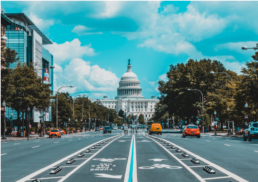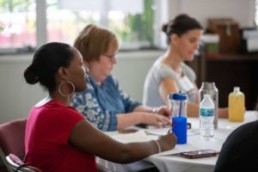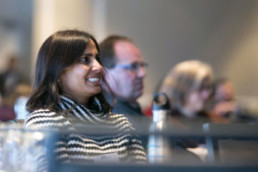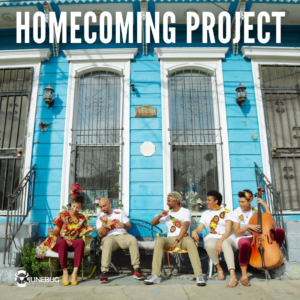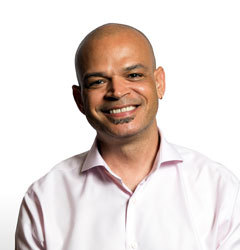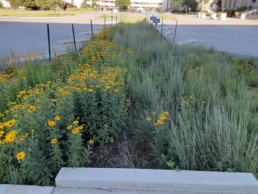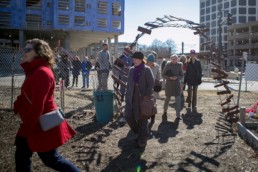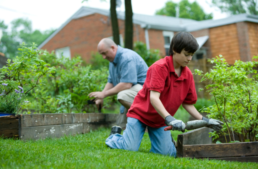The Network Effect: The Power of Connections for Social and Environmental Justice
BY Nathan Boon, Senior Program Officer, Watershed Protection, William Penn Foundation &
Sulaiman Rahman, Founder and CEO, DiverseForce
The nonprofit world lives in the shadow of systemic racism. This is not new news, and its effects on non-governmental organizations are both well-documented and at the forefront of many funders’ minds.
The partnership and cohort-based training program we have created together is not the only or complete answer to this challenge, but it is worth sharing because we believe it’s replicable, affordable, and impactful.
We’ve each sought to leverage what’s called the network effect in our work: Nathan Boon in the world of grantmaking at the William Penn Foundation, and Sulaiman Rahman in the realm of recruitment and professional development at DiverseForce. The network effect describes the observation that organizations designed around large, diverse networks enjoy more success and impact than those that are not. Over the past two years, we’ve worked together to activate the network effect to address power inequities across the Greater Philadelphia region’s nonprofit sector, including within organizations working on environment and conservation, where lack of inclusion is especially prevalent.
In all areas of our grantmaking, from multi-state watershed protection programs such as the Delaware River Watershed Initiative, to our work fostering learning and creative communities, we are eager to address this challenge. The dearth of diverse leadership at nonprofit organizations has made many less equipped to address a wide variety of the social and environmental needs facing our region — needs made all the more urgent by COVID-19, climate change, and the movement for Black lives. This leadership gap is not unique to William Penn Foundation’s grantees, but part of a national trend holding the sector back from realizing its full potential.
In addition to the foundation's own ongoing internal work in this area, we’ve supported organizations throughout our networks who are hungry to learn and grow into more equitable agents for change. The missing piece of the puzzle was a partner who could work with grantees to shift culture and practice where the most influential decisions were being made: the boardroom.
Enter DiverseForce.
DiverseForce was born of the network effect. It grew out of the Urban Philly Professional Network, a series of events drawing 18,000 Black and Latinx professionals to make connections, talk politics, and become more civically engaged. The program evolved into a trusted resource for companies and organizations seeking more diverse board leadership. The driving insight of the DiverseForce On Boards program? That even the most well-intentioned boards often lack the network and outlook needed to recruit and retain members of color.
DiverseForce became connected with the William Penn Foundation through an evaluation partner, the ImpactED Center at the University of Pennsylvania. ImpactED was a key adviser in the design of the On Boards curriculum. Starting in 2019, the three organizations explored ways to bring DiverseForce’s network and expertise to the foundation’s grantees, with the understanding that it’s not enough to place “Black and brown faces in high places.” There needs to be culture-shift, education, and ongoing support — for both the candidate and the organization.
To date, more than two dozen regional nonprofit organizations have seated 30 new board members from the DiverseForce program, from stalwart institutions to small local groups. Many organizations share with us that their DiverseForce board recruits are the most engaged and innovative members they have. Melinda Johnson, a recent match for Camden, New Jersey’s landmark Center for Aquatic Sciences, now chairs their board’s development committee.
The William Penn Foundation-DiverseForce partnership is ongoing and retooling in light of COVID. In the interim, here are five lessons learned as other grantmakers look to leverage the network effect:
1. Invest in networks. All too often, organizations ask the same three people of color in their orbit to volunteer their time and give unpaid advice. One way funders can counter this exploitative practice is to invest directly in organizations with networks to build relationships and co-create service opportunities.
2. Invest in system-wide capacity. William Penn Foundation had numerous one-on-one conversations with grantees where they shared equity as a growth area and critical need. When the opportunity arose to work with DiverseForce, the foundation saw it as an effective way to support multiple grantees across its entire portfolio. DiverseForce’s cohort model also amplifies peer-to-peer learning between the organizations.
3. Prepare the soil before planting the seed. DiverseForce works to upskill organizations while seating new board members. This practice is crucial so that candidates are not placed in non-inclusive environments. This preparation includes training to identify racial blindspots that have become institutionalized at an organization over time, and on how to value a candidate for their “culture add,” rather than “culture fit.” This process also equips organizations to embrace healthy conflict that arises from new candidates bringing fresh ideas.
4. Grow the candidate. DiverseForce prepares candidates to bring their full, impactful selves to the boardroom. Coaching candidates for several organizations in a cohort model, DiverseForce works to instill confidence, build “governance muscles”, and combat the imposter syndrome that professionals of color say they sometimes experience when entering new institutional spaces. One new board member was inspired by her experience to subsequently run for her local school board.
5. And finally: You can’t micromanage equity. The William Penn Foundation made its investment in DiverseForce and then stepped out of the way. This partnership would not have worked without the foundation remaining flexible, open, and culturally humble.
_________
About the Authors:
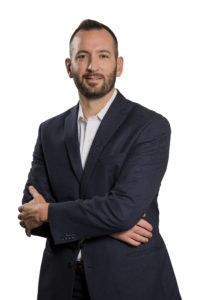
Nathan Boon, Senior Program Officer, Watershed Protection, William Penn Foundation
Nathan supports science- and data-driven approaches to protect and restore the Delaware River watershed: drinking water source for New York City, Philadelphia, Trenton and Wilmington. Before joining the William Penn Foundation in 2012, Nathan worked with the consulting firm Booz Allen Hamilton providing strategic planning and portfolio management services. Nathan was previously embedded in francophone Cameroon with the 501(c)(3) nonprofit Breaking Ground, engaged with a local municipality in water-quality analysis and health-impact assessment. Nathan’s nonprofit experience also includes time as a board member with the American Water Resources Association, National Capital Region Section, and membership with the American Public Health Association, Environment Section.
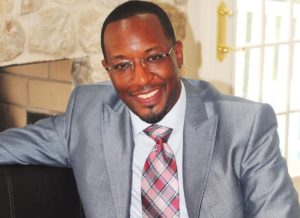
Sulaiman Rahman, Founder and CEO, DiverseForce
Sulaiman W. Rahman is the founder and CEO of DiverseForce, a strategic human capital solutions firm that specializes in cultivating diverse leadership pipelines and inclusive ecosystems across all sectors. In 2017, DiverseForce partnered with the University of Pennsylvania to develop DiverseForce On Boards, an innovative leadership development program that trains mid-to-senior level professionals of color from the public and private sectors to serve more effectively on nonprofit boards in the region. The program’s success has attracted support from major corporations and foundations.
Rahman currently serves as vice president of the board of directors for Community College of Philadelphia Foundation; board of trustee and executive committee member for Mastery Charter Schools; board member and governance committee member for the Kimmel Center of Performing Arts; and board member for Lendistry, a start-up fintech company. Rahman also serves on numerous advisory boards and committees.
Interested in contributing to TFN's Blog?
TFN is committed to sharing and amplifying the insights, expertise and experiences of our members, partners and others in the broader philanthropic community. If you are interested in submitting a guest blog post, please reach out to TFN Director of Communications Tere Figueras Negrete at tere@fundersnetwork.org.
Join our Mobility & Access Collaborative webinar to learn how an emergent transit justice movement won billions in federal funds
BY TFN STAFF
Faced with devastating cuts to the transit service on which essential workers and many people with low incomes depend, local advocates from around the country came together to build a national infrastructure that secured billions in federal COVID-19 relief funding. Along the way, they changed the nature of the transit conversation in Congress to one that centers riders instead of the traditionally dominant voices of big agencies, big labor, big green and big construction interests. A set of transit justice principles, created by the network, guide the work.
Are you interested from learning from funders and organizers about their experiences, what they are doing and learning, and what comes next?
Join the Mobility and Access Collaborative, a TFN initiative, at 2 p.m. ET March 2 for Zero to Sixty: How an Emergent Transit Justice Movement of Community-Based Organizations Won an Estimated $60 Billion in Federal Funds.
The lessons learned about power building, organizing and networking are relevant to anyone interested in systems change and rebooting conversations.
Be sure to register for this funder webinar by March 1 in order to receive log-in details.
Speakers:
Welcome:
Darryl Young, Director, Sustainable Cities Program, Summit Foundation
What We Accomplished:
David Bragdon, Executive Director, TransitCenter
Theory of Change:
LeeAnn Hall, Executive Director, Alliance for a Just Society
How We Built Power: Local leaders tell their stories:
Betsy Plum, Executive Director, NY Riders Alliance
Joshua Malloy, Community Organizer, Pittsburghers for Public Transit
Azhar Chougle, Executive Director, Miami-Dade Transit Alliance
Jessica Meaney, Executive Director, Investing in Place
Scott Frazier, Consultant, Investing in Place
This webinar will also include a Q&A with funders
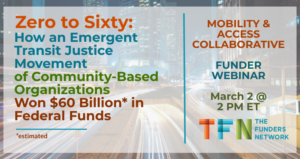
#TFN2021 speaker update: Plenary speaker Rukia Lumumba of People's Advocacy Institute + Critical Conversations on deck!
BY TFN STAFF
We’re thrilled to share new updates to our lineup of speakers and sessions for The Funders Network’s 2021 Virtual Conference: Rise Together.
New this week: We are excited to announce our newest plenary speaker, Rukia Lumumba, executive director of the People’s Advocacy Institute and co-director of the Movement for Black Lives’ Electoral Justice Project.
Read on to learn more about Rukia and her work — as well as our new conference feature, Critical Conversations, which offers facilitated peer-to-peer conversations in order to create a space for funders to explore difficult issues.
TFN’s 2021 Virtual Conference: Rise Together takes place March 15-17. Stay tuned for additional updates and other conference news!
Rukia Lumumba
Transformative Justice Strategist & Human Rights Activist

We are excited to share that Rukia Lumumba, executive director of the People’s Advocacy Institute and co-director of the Movement for Black Lives’ Electoral Justice Program will join us as a plenary speaker for #TFN2021!
A transformative justice strategist and human rights activist, Rukia is the daughter of the late community justice icon Chokwe Lumumba, who served as mayor of Jackson, Miss., and Nubia Lumumba. Rukia continues the Lumumba family’s rich history of advancing issues and initiatives that elevate the legal, economic, health and educational rights of individuals, families and communities.
For more than 18 years, she has worked within and outside the system to foster justice for all, especially as it relates to criminal justice disparities for people of color. She has served as director of two of New York state’s largest criminal justice nonprofits, CASES (the Center for Alternatives Sentencing and Employment Services) and the Center for Community Alternatives, providing visionary leadership and building community and system partnerships to help break the prison pipeline.
During her leadership tenure, more than 4,200 youths received supportive community-based services including housing, education, job, and health and well-being services, in lieu of incarceration. She also served as co-chair of the Anti-Violence and Criminal Justice Working Group and steering committee member of the first Young Women’s Initiative in the United States dedicated to developing gender equitable policies in New York City, particularly for young women of color.
Rukia also served as campaign manager for her brother Chokwe Antar Lumumba’s successful 2017 run for mayor of Jackson, Miss., which made him the second Lumumba to hold that title.
Critical Conversations
In this time of social distancing, it’s important for us to connect with compassion, humanity and understanding. TFN’s conference will offer Critical Conversations, an opportunity to have frank, open, peer-facilitated exchanges of ideas and experiences, and perhaps learn a little bit about each other in the process. Each session will be led by a facilitator with a deep personal or professional connection to the topic.
Critical Conversations @ #TFN2021:
COVID-19 & Racism
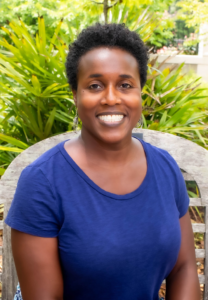
Facilitator: Jasmine N. Hall Ratliff, Deputy Director for Culture and Strategy, Keecha Harris and Associates
Monday, March 15 | 1:30 to 2:15 p.m. ET
Being Black in Philanthropy

Facilitators: Shawn Escoffery, Executive Director, Roy & Patricia Disney Family Foundation; Member, TFN Board of Directors and Marcus Walton, President & CEO, Grantmakers for Effective Organizations
Monday, March 15| 2:45 to 3:30 p.m. ET
Decolonizing Leadership
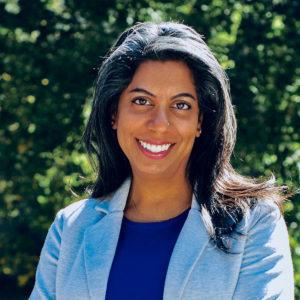
Facillitator: Bina Patel, CEO, Saathi Impact Consulting, and TFN PLACES Alum/Fellowship Facilitator
Wednesday, March 17 | 12:30 p.m. to 1:15 p.m. ET
Healing and Trauma
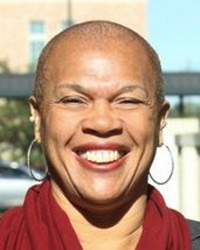
Facilitator: Dr. Denese Shervington, Clinical Professor of Psychiatry, Tulane University School of Medicine and President and CEO, Institute for Women and Ethnic Studies
Wednesday, March 17 | 12:30 – 1:15 p.m. ET
Who else will be at #TFN2021?
TFN’s 2021 Virtual Conference: Rise Together will encourage funders to explore the strategies and stories that are creating more equitable, sustainable, and resilient places to live — work that has taken on increased urgency as we face the dual challenges of a global pandemic and structural racism.
We’ve designed sessions that are intersectional, cross-cutting and grounded in racial equity and speak to activism, collaboration and movement building.
Please check out our TFN 2021 Virtual Conference: Rise Together webpage for more updates and conference highlights
Who's speaking at #TFN2021? Read about our plenary speakers and other highlights
BY TFN STAFF
We're thrilled to share new updates to our lineup of speakers and sessions for The Funders Network's 2021 Virtual Conference: Rise Together. TFN's virtual conference will bring compelling and inspiring plenary sessions that will explore how BIPOC women are harnessing political power in the South, celebrate the art of Black storytelling, and delve into the urgent need to build a multiracial movement for racial justice.
Opening Plenary
Women of Color — Building Power and Revitalizing Democracy

Monday, March 15 | 12:30 to 1:15 p.m. ET
The radical visions and practical solutions arising from communities facing relentless racial terror, compounding health and climate crises, and historic disinvestment offered key lessons to funders during 2020. Whether we begin with the undeniable urgency of COVID-19, police brutality, or economic and ecosystem collapse, we see the culture-led strategies from the South as potent examples of movement innovation across all challenges.
This session shares the visions and lessons of leaders deeply connected to intergenerational and intersectional movements across the South who know what’s possible for economic development, housing, climate resiliency, energy/food/water ecosystems, and our culture. This conversation is an invitation to show up in ways that transform scarcity into abundance, not only in the resources moved or practices held in philanthropy, but more broadly in our very culture of leadership.
Speakers:
Colette Pichon Battle, Executive Director, Gulf Coast Center for Law and Policy
Chandra Farley, Just Energy Director, Partnership for Southern Equity
Jacqueline Thanh, Executive Director, VAYLA New Orleans
Gloria Walton, CEO, The Solutions Project
Homecoming Project: Lift Every Voice
Monday, March 15 | 4 p.m. ET
TFN is honored to welcome New Orleans-based Junebug Productions' Homecoming Project to share their work at our 2021 virtual conference.
The Homecoming Project is a community-based, storytelling performance series that aims to marry high-quality artistic practice with a commitment to maintaining the essential relationship between culture and progressive social change through engagement with New Orleans communities that have been historically oppressed and exploited.
Junebug is the organizational successor to the Free Southern Theater, founded in 1963, whose objective was to stimulate creative and reflective thought among African Americans in the rural South by bringing the theater to the people. The Homecoming Project honors that vision with performances that activate public spaces in the neighborhoods they are meant to reflect, making sure that they are accessible to all.
Closing Plenary: Glenn Harris
President, Race Forward & Publisher, Colorlines
Wednesday, March 17 | 4:15 p.m. ET
We are excited to have Glenn Harris, president of Race Forward and publisher of news site Colorlines, with us as our 2021 closing plenary speaker.
Race Forward catalyzes movement building for racial justice. In partnership with communities, organizations, and others, they build strategies to advance racial justice in our policies, institutions, and culture.
Race Forward united with the Center for Social Inclusion (CSI) in 2017 — in part to address an urgent need to build a multiracial movement for racial justice, and out of recognition that the two racial justice organizations were stronger together.
The new Race Forward is home to the Government Alliance on Race and Equity (GARE), a national network of government working to achieve racial equity and advance opportunities for all, which Harris helped found. Race Forward also publishes the daily news site Colorlines and produces Momentum: A Race Forward Podcast featuring stories and strategies for racial justice.
Harris has more than 25 years of experience working on issues of race and social justice, including as president of Center for Social Inclusion from 2014 until its union with Race Forward. Prior to the new Race Forward and CSI, Harris served as manager of Seattle's Race and Social Justice Initiative (RSJI), whose mission is to end institutionalized racism in city government.
Also on the Agenda...
TFN’s 2021 Virtual Conference: Rise Together will create a virtual space for funders to explore the strategies and stories that are creating more equitable, sustainable, and resilient places to live — work that has taken on increased urgency as we face the dual challenges of a global pandemic and structural racism.
We’ve designed sessions that are intersectional, cross-cutting and grounded in racial equity and speak to activism, collaboration and movement building. Please take a look at our Conference Agenda for the latest on our lineup of sessions and speakers.
New this year
Critical Conversations
In this time of social distancing, it’s important for us to connect with compassion, humanity and understanding. TFN’s conference will offer Critical Conversations, an opportunity to have frank, open, peer-facilitated exchanges of ideas and experiences, and perhaps learn a little bit about each other in the process. Some themes we'll explore: Covid & Racism; Being Black in Philanthropy; Decolonizing Leadership and Healing & Trauma. Please take a look at our Conference Agenda for times and facilitators.
Shop Local...From Afar
Our Shop Here! Virtual Market offers conference participants the opportunity to order directly from NOLA-based vendors, artisans, and social enterprises as a way to support these local vendors and minimize the economic impact of our inability to convene in New Orleans because of the COVID-19 pandemic. (Launching soon, please stay tuned!)
More to Come!
Please be sure to check out our conference webpage for more information on registration, events, and updates on speakers and sessions. (And be sure to follow us on Twitter @funders_network for more #TFN2021 news.)
New grant opportunities! Partners for Places launches new round to support sustainability projects in U.S. and Canada
BY TFN STAFF
The Funders Network (TFN), in partnership with the Urban Sustainability Directors Network (USDN), is pleased to announce the opening of the latest round of the Partners for Places grant program.
The deadline to submit proposals is March 19.
Partners for Places is a successful matching grant program that improves communities by supporting equitable sustainability projects that build partnerships between local government leaders, community groups and place-based foundations in the U.S. and Canada.
National funders invest in local projects developed through these partnerships to promote a healthy environment, a strong economy and well-being for all residents.
Through these investments, Partners for Places fosters long-term relationships that make our communities more resilient, prosperous and equitable.
These one-to-one matching awards provide partnership investments between $25,000 and $75,000 for one-year projects, or between $75,000 and $150,000 for two-year projects, with a 1:1 match required by one or more local foundations.
Interested in applying?
Download the Round 18 Invitation to Apply and the Round 18 Application and Award Guidance Document.
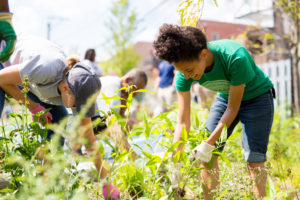
Strategic Direction
Collaboration and partnership are at the heart of the Partners for Places program.
Since 2012, the matching grant program has helped foster dozens of new partnerships between local government sustainability leaders and place-based funders across the U.S. and Canada — relationships that often continue long after the original Partners for Places project has been completed.
In recent years, the grant program has adopted a strategy that leads with racial equity and a sharper focus on how best to advance equitable and sustainable communities.
Starting with the Round 17 Invitation to Apply released in July of 2020, the primary partners have been expanded to include local frontline community-led groups.
This collaborative partnership model is intended to more deeply embed the values and practice of racial equity into local community decision-making processes. Read about the Round 17 grantees here.
About Partners for Places
Partners for Places is led by TFN in partnership with the USDN. As in previous grant cycles, we are excited to partner with Green Infrastructure Leadership Exchange, a practitioner network that supports communities seeking to grow green stormwater infrastructure (GSI) programs, to support outreach efforts.
To date, Partners for Places has awarded nearly $8.2 million across North America in this successful matching grant program, leading to over $17 million in investments.
The program is currently supported by five investor foundations: The JPB Foundation, The Kendeda Fund, The Kresge Foundation, The New York Community Trust, and Pisces Foundation.
Submitting a Successful Proposal
Partners for Places currently administers two grant programs: General Grants, and a Mini Grants program.
General Grants in Round 18 will:
1. Create or improve collaborative partnerships between a local government sustainability and/or water department(s), frontline community-led group(s), and place-based funder(s).
2. Advance an equitable sustainable climate action and/or GSI project that addresses frontline community priorities.
3. Apply a racial equity approach to both the collaboration and the project planning/implementation.
The application deadline for Round 18 is March 19, 2021 (by 11:59 p.m., any time zone).
Please visit the Partners for Places webpage for more information. Here you can view our promotional video, download the Round 18 Invitation to Apply, which includes the Grant Application and Budget form. You may also consult the Round 18 Application and Award Guidance Document.
Additional Resources
Register for our Round 18 Informational Webinar designed to help potential applicants prepare a proposal on Feb.16 at 4 p.m. ET. Register here.
Read this feature story about Partners for Places in Inside Philanthropy here.
For more information about the Partners for Places program, please feel free to reach out to Ashley Quintana at ashley@fundersnetwork.org.

Apply Today! TFN's Systems Transformation Learning Series
BY TFN STAFF
Note: This post has been updated to reflect the extended period for Early Bird applications.
The Funders Network is excited to announce our new Systems Transformation Learning Series, which will help funders gain the frameworks, methods and tools to catalyze and support systemic change.
As we continue to see the ongoing harm caused by growing economic inequity, ongoing structural racism, deepening political polarization and a worsening climate crisis, we are committed to helping the sector find concrete and actionable ways to work together in support of the communities we serve.
TFN believes that systems thinking frameworks and collaborative network practices are a powerful combination for addressing the complex, interconnected and systemic problems we face.
Supported by the Garfield Foundation, this five-part learning series will offer deep dives into the key concepts and capacities that will allow grantmakers to be true changemakers —identifying strategic actions and pathways that will accelerate lasting solutions.
The series is open to all funders, and will bring together grantmakers from diverse backgrounds and program portfolios.
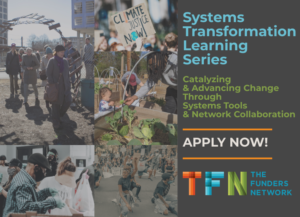
How to Apply
The deadline to apply for TFN’s Systems Transformation Learning Series is midnight Feb. 25, 2021.
You can complete our online application form here.
Candidates that apply before midnight Feb. 17 and are ultimately accepted will receive a discounted Early Bird rate.
Applicants will be notified by March 12 if they have been accepted.
Registration Fees
Early Bird Rate
For accepted participants who submitted applications before midnight Feb. 17.
• TFN Members: $1,350 per person
• Non-members: $1,550 per person
Regular Rates
For accepted participants who apply on or after Feb. 18.
• TFN Members: $1,650 per person
• Non-members: $1,850 per person
About this Series
• This Learning Series cohort is limited to 30 participants.
• The series will consist of five virtual sessions, each four-hours long, with applied exercises between sessions.
• Sessions will take place from 1 to 5 p.m. ET on these dates:
April 7
May 26
June 30
July 14
July 28
Scholarships
We recognize that many organizations are facing challenges during these uncertain times. We have a limited number of scholarships to help offset the cost this learning series. If cost is a barrier to participating in this event, please reach out to TFN Director of Programs Ann Fowler Wallace at ann@fundersnetwork.org.
Who Should Join our Systems Transformation Learning Series?
• Do you want clearer sense of how to show up as a funder in systemic collaborations?
We’ll explore how to optimally engage as a funder in a network/multi-stakeholder collaborative; roles that are more and less appropriate for funders; how to mitigate negative impacts from power differences; and the power of transparency, self-disclosure, and vulnerability.
• Are you seeking a better understanding of the essential conditions for effective systemic collaboration? We’ll learn about core factors that have contributed to the success of systemic collaborations among funders and between funders and NGOs, why these factors are important, and some ways to evaluate process and impact outcomes in systems change work.
• Are you searching for insight on how to collaborate effectively with other funders? This learning series includes how to get other funders to co-invest and address perceived turf conflicts, the desire for “unique” success, and each funder’s commitment to its own theory of change.
• Are you trying to navigate the interests of trustees, donors and stakeholders? We will share strategies for aligning trustee and donor interests and priorities with those of system stakeholders and to do productive work with their interests, values, and ‘resistance’ to change.
• Are you in open to new funding ideas, approaches and models? This series will share ways to support systemic collaborations that don’t rely entirely on your organization’s funding.
• Would you like to enhance your ability to see and work effectively with a number of creative tensions or polarities that always show up in funding systems change? Join us as we find ways to effectively balance:
– Funder needs/priorities and grantee needs/priorities
– Collective intent/vision and differentiated situations/needs
– Short-term wins and Long-term strategies
– Learning and action
– Individual change & Institutional change
– Diagnostic approaches & Dialogic approaches
Trainers and Facillitators
TFN’s Systems Transformation Series will be led by Russ Gaskin and Luzette Jaimes of CoCreative, which specializes in developing multi-stakeholder “innovation networks” to solve complex problems like revitalizing economically distressed communities, closing racial equity gaps along multiple dimensions, growing employee ownership, building regenerative food supply chains, and eliminating harsh toxins from electronics manufacturing facilities. To learn more about the CoCreative team and their work, please visit wearecocreative.com.
If you have any questions about TFN’s Systems Transformation Learning Series, feel free to reach out to Director of Programs Ann Fowler Wallace at ann@fundersnetwork.org.
Small Cities Can Lead on Clean Energy, Too
BY American Council for an Energy-Efficient Economy (Cross post)
This post was originally shared on the American Council for an Energy-Efficient Economy (ACEEE) website, announcing the results of a 30-city analysis of how smaller municipalities are approaching and incorporating clean energy. The Community Energy Challenge is sponsored by ACEEE, the Sustainable States Network, Sustainable CT, Green Cities California, Sustainable Maryland, Minnesota GreenStep Cities, and Sustainable Jersey. (The work and participating organizations are supported by several TFN members, including the Emily Hall Tremaine Foundation and the Geraldine R. Dodge Foundation.) For the full ACEEE announcement, visit their website here.
An recent analysis by of clean energy efforts by 30 small cities finds several leaders taking significant steps to cut energy waste and embrace clean energy—pointing the way for other small municipalities across the country to do the same. The American Council for an Energy-Efficient Economy (ACEEE) examined the cities’ efforts to make homes and buildings more energy efficient, to scale up the use of renewable energy, and to ensure community involvement in developing equitable clean-energy policies. The cities analyzed, with populations generally between 16,000 and 100,000, are in California, Connecticut, Maryland, Minnesota, and New Jersey.
San Luis Obispo (California) received the top score of the group, earning points for its policy incentivizing all-electric equipment and appliances in new buildings and for participating in a program that offers carbon-free electricity to residents. Second place went to Goleta (California), followed by St. Louis Park (Minnesota), Manhattan Beach (California), West Hollywood (California), West Hartford (Connecticut), Rockville (Maryland), Dublin (California) and Red Wing (Minnesota) (tied), and Rochester (Minnesota).
ACEEE evaluated each of the communities on policy metrics assessing government operations, community initiatives, buildings policies, and energy and water utilities. The combined scores allowed ACEEE to rank the municipalities. The analysis assessed policies and programs to make energy efficiency upgrades in homes and businesses, accelerate the adoption of renewable energy, set long-term commitments to reduce greenhouse gas emissions, and establish and enforce building codes.
ACEEE scored the cities’ energy efficiency and renewable energy strategies using the metrics from its annual City Clean Energy Scorecard, employing a modified version of its Local Clean Energy Self-Scoring Tool, Version 4.0 released in 2019. The leading small cities outperformed a significant portion of the larger cities scored each year (excepting transportation policies, which were not evaluated for the small cities).
The 30 cities volunteered to be evaluated as part of the Community Energy Challenge sponsored by ACEEE, the Sustainable States Network, Sustainable CT, Green Cities California, Sustainable Maryland, Minnesota GreenStep Cities, and Sustainable Jersey. Moving forward, ACEEE and the Great Plains Institute will provide the cities with technical assistance to support their energy efficiency and renewable energy efforts.
While each participating city is taking steps to reduce greenhouse gas emissions, the highest scorers led the way by setting goals to reduce energy use and greenhouse emissions, adopting green building requirements, and pressing for decarbonization of the electric grid. Even these leaders have significant room to grow, earning roughly half of the available scoring points.
“We found that even quite small cities and towns can take meaningful action to cut energy waste and reduce carbon emissions,” said David Ribeiro, director of local policy at ACEEE. “A number of critical tools to fight climate change—and to do so in an equitable way—are things that have to be set locally. From the largest cities to the smallest ones, they’re all going to need to step up further. We hope some of these leading cities can help show the way for their peers.”
To view the scores and ranks of cities participating in the Community Energy Challenge, visit the ACEEE page here.
Planning for Greening Community Development Stimulus Funding | Webinar Jan. 28
Please join funder and community development colleagues for a webinar that will explore how the $12 billion Neighborhood Capital Investment program created through the last stimulus can be leveraged by community development financing institutions, green banks, and foundations to help advance local sustainability and climate goals.
The Jan. 28 webinar, Planning for Greening Community Development Stimulus Funding, is co-sponsored by TFN as well as the Climate and Energy Funders Group, Coalition for Green Capital, Environmental Grantmakers Association, The William and Flora Hewlett Foundation, Inclusiv, and the New York Community Trust.
Amir Kirkwood from the Opportunity Finance Network (OFN) will present on overview of this program, which focuses explicitly on low-income communities and communities of color. This presentation will be followed by a panel discussion of how these significant federal resources could help communities across the nation weather the continuing pandemic and finance a green recovery in its aftermath.
Moderator
Arturo Garcia-Costas, The New York Community Trust
Speakers
Marilyn Waite, William and Flora Hewlett Foundation
Amir Kirkwood, The Opportunity Finance Network
Frank Altman, Community Reinvestment Fund, USA
Duanne Andrade, Florida Solar & Energy Loan Fund
The panel discussion will be followed by Q&A. RSVP here to reserve your spot. Please note that this webinar is also open to non-funder partners of the Coalition for Green Capital and Inclusiv networks.

'Repair our Tattered Social Fabric and Help our Democracy Live up to its Ideals'
BY TFN STAFF
Like all of you, we at The Funders Network are horrified, saddened and angered by the disgraceful assault on democracy that unfolded in Washington D.C. this week.
We join with our peers in the philanthropic sector in speaking out against falsehoods, political violence and unequal justice.
TFN is proud to sign on to the below letter, circulated by the Democracy Funders Network and originally published on Medium, which condemns the violent insurrection at the U.S. Capitol Building and calls for accountability.

Philanthropies Condemn Political Violence, Call on Leaders to Protect Democracy and Get Back to the People’s Business |
|
As representatives of nonpartisan philanthropic institutions, serving rural, urban, and suburban communities across the nation, we condemn the violence that broke out at the U.S. Capitol this week. The events in Washington are a stain on our nation’s history and a painful break in the peaceful transition of power that has been a defining hallmark of American democracy for more than 200 years. The shameful events are the result of actions by President Trump and other political leaders who have recklessly fanned the flames of grievance. Those responsible for this deadly violence and insurrection must be held to account, and we call on Republican leaders, in particular, in government and media to unequivocally reject conspiracy theories and the actions of extremists who use violence. After hard-fought campaigns, extraordinary voter turnout, and the resolution of more than 60 election-related lawsuits, it is long past time for our nation to accept the results of the 2020 election so that our duly elected leaders — President-elect Biden, Vice President-elect Harris and members of the 117th Congress — can move forward with addressing the nation’s pressing challenges. Our organizations donate hundreds of millions of dollars to charitable causes each year to advance the common good. While we have different funding approaches, vary in our areas of focus, and are ideologically diverse, we share a belief in the importance of finding common ground to solve problems and serve people and communities. And while we may vary in our views on the size and scope of government, we share a belief that safeguarding the health, security, and rights of people and communities requires a government whose leaders can accept the election results, bridge divisions that have roiled our nation, work in good faith to forge solutions, and stand up for democracy. As the U.S. faces the most dire global health emergency in 100 years, the worst economic crisis in modern history, and a racial reckoning overdue for centuries, it is time to move on from last year’s election, cease further delays in the transition of power, and turn to governance. To our duly elected leaders, we urge you to follow facts and let science lead the way toward solving the COVID-19 crisis. We encourage you to listen to diverse voices — including those of people who have been overlooked, forgotten, and excluded, and who are facing persistent threats to their lives and livelihoods. We call on you to repair our tattered social fabric and help our democracy live up to its ideals. And we stand ready to work with you to move our country forward and increase opportunity for all who call it home. Visit the Medium post for contact information to add your organization's name to the letter, and to read the full list of signatories, which include many TFN members and partners. To read more reactions from the philanthropic sector, including statements from several TFN members and partners, read this round-up from the Chronicle of Philanthropy. |
Join us for Strengthening the Circle: Indigenous Approaches to Holistic, Inclusive Economies
BY TFN STAFF
North American Indigenous communities are calling upon deep connections to history, place and culture to develop distinctive forms of economic revitalization and community wealth-building.
We invite you to join our next learning network webinar, Strengthening the Circle: Indigenous Approaches to Holistic & Inclusive Economies at 2 p.m. ET Jan. 20, to learn how native leaders and community members are integrating traditional tools of community development with culturally specific strategies for long-term investment and sustainable impact.
The Amskapi Piikani (Blackfeet Nation), a tribe whose territory historically spanned from Montana into Canada along the Rocky Mountains, but whose reservation now only covers 1.5 million acres in northwestern Montana, are using food and natural resource management to drive economic renewal.
Through Blackfeet ways of knowing, being and planning, Blackfeet Nation members have developed an Agricultural Resource Management Plan that incorporates language and cultural revitalization, buffalo restoration, local healthy food sources, a new tribal protected area and a multi-species meat processing facility.
At the Northern Cheyenne Reservation, which lies on 444,000 acres in southeastern Montana, People’s Partners for Community Development is tapping tribal connections to support entrepreneurship and self-sufficiency to create long-term financial strength that can echo forward for generations. Since incorporating as the Community Development Finance Institution, the organization has originated more than 500 loans totaling in excess of half a million dollars to help tribal members launch small businesses on the reservation.
On the Crow Indian Reservation in south central Montana, Plenty Doors Community Development Corporation works to strengthen their community through business, entrepreneurship, and community development. They are devoted to creating thriving communities through a strong diverse economy while preserving the unique cultural and environmental qualities of our community.
Participants will come away from the webinar with an appreciation of the power of culturally-based revitalization and its application to communities across a range of settings.

Strengthening the Circle: Indigenous Approaches to Holistic, Inclusive Economies
Jan. 20 at 2 p.m. ET
*Register here.*
Speakers:
Loren BirdRattler, Project Manager, Blackfeet Agriculture Resource Management Plan
Charlene Johnson, Executive Director, Plenty Doors CDC
Sharon Small, Executive Director, People’s Partner for Community Development
Moderator:
Bonnie Sachatello-Sawyer, Executive Director, Hopa Mountain


